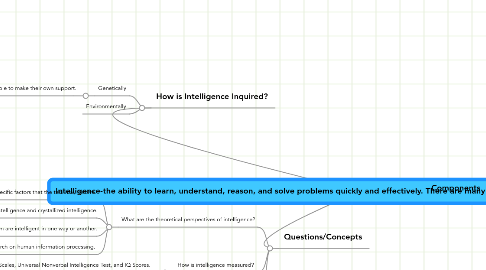
1. Components
1.1. Understanding & Reasoning-An intelligent person has the abilities to understand and problem-solve and have the necessary process to do both successfully.
1.2. Genetics-children with disabilities have a more difficult time understanding and problem solving. Also, most children have a similar IQ to those of their parents.
1.3. Ability-Each child’s learning ability is unique and based on previous education and experience. There are factors that can contribute to a child’s learning ability.
2. How is Intelligence Inquired?
2.1. Genetically
2.1.1. Intelligence is inquired genetically and environmentally. Genetic variation has a significant impact on IQ. During early years, environmental factors also contribute to intelligence because parental support and resources are positive for the child. During later years this factor decreases as the child is able to make their own support.
2.2. Environmentally
3. Questions/Concepts
3.1. What are the theoretical perspectives of intelligence?
3.1.1. Spearman-people's performance on any given task depends both on the general factor and on any specific factors that the task may involve.
3.1.2. Cattell-people differ in fluid intelligence and crystallized intelligence.
3.1.3. Gardner-offers the possibility that the great majority of children are intelligent in one way or another.
3.1.4. Sternberg-focuses more on the nature of intelligence itself. He draws his findings on research on human information processing.
3.2. How is intelligence measured?
3.2.1. Usually tests are given to identify those with special needs or giftedness. Intelligence tests usually include a wide variet of questions and problems. Some examples of tests are Wechsler Intelligence Scale for Children, Stanford-Binet Intelligence Scales, Universal Nonverbal Intelligence Test, and IQ Scores.
3.3. What role do cognitive processes play in intelligence?
3.3.1. the way a person interprets and approaches new situations has a lot to do with the way they process things.
